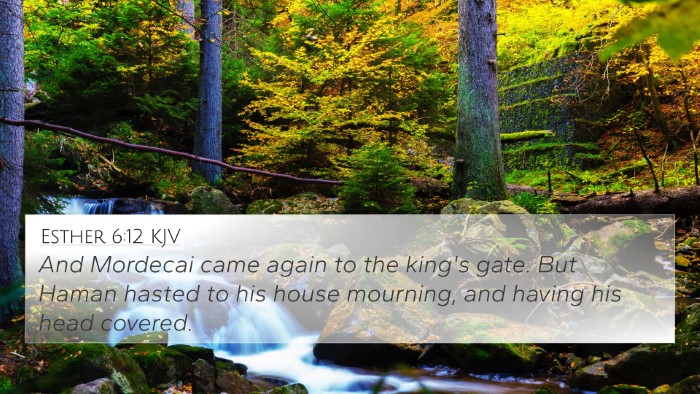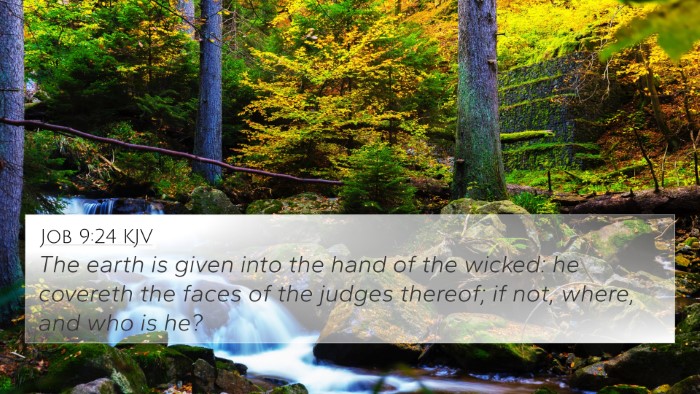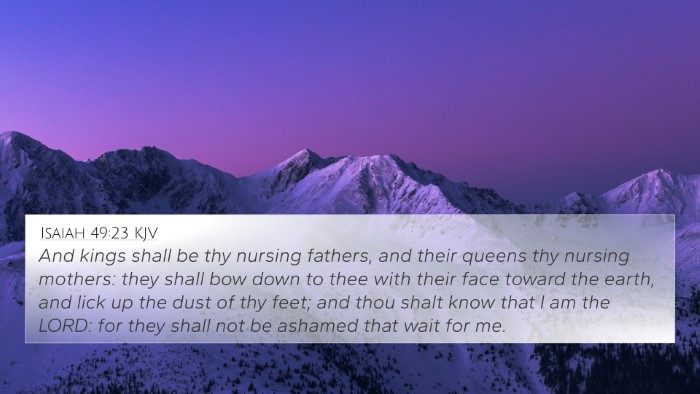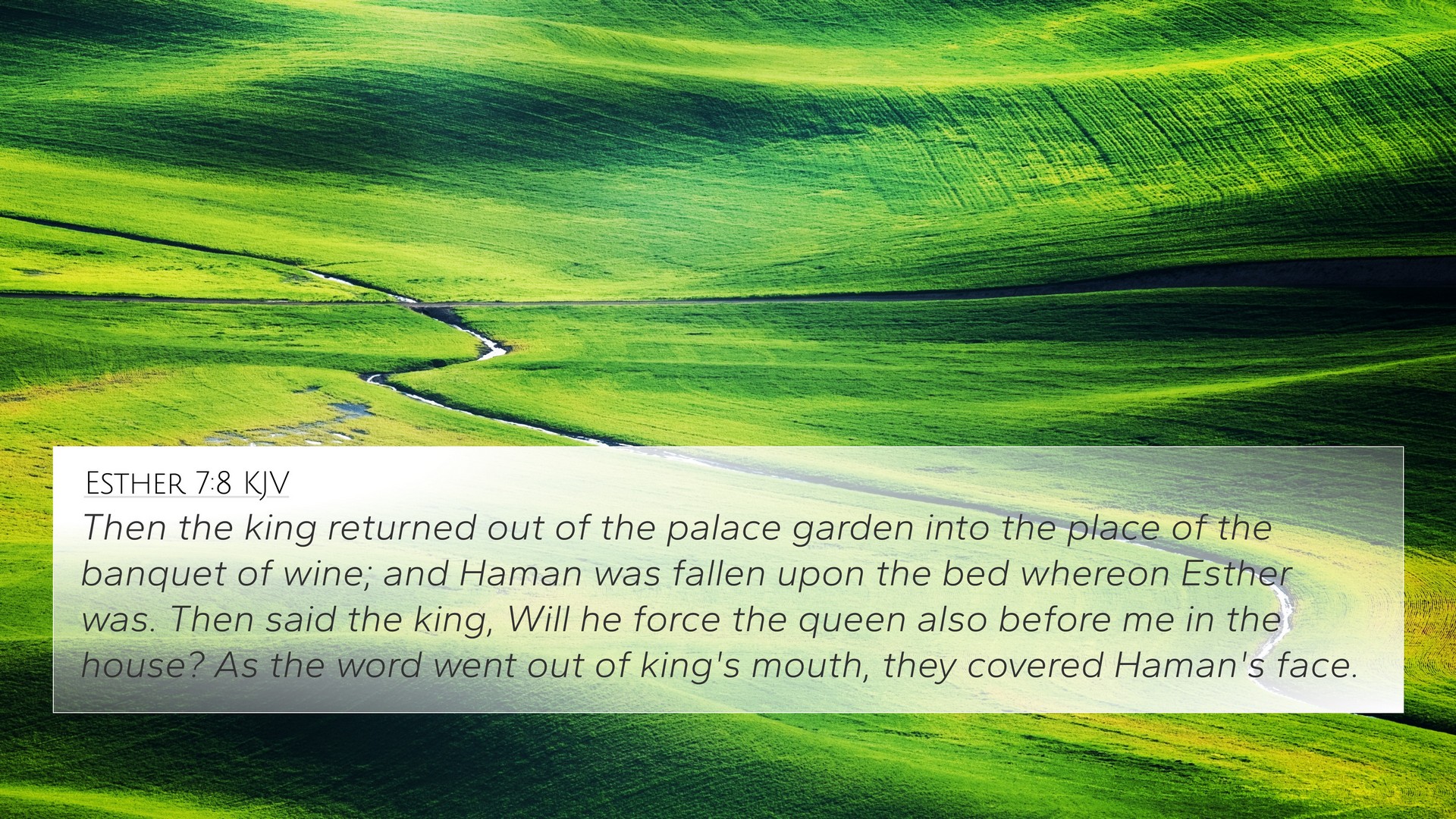Old Testament
Genesis Exodus Leviticus Numbers Deuteronomy Joshua Judges Ruth 1 Samuel 2 Samuel 1 Kings 2 Kings 1 Chronicles 2 Chronicles Ezra Nehemiah Esther Job Psalms Proverbs Ecclesiastes Song of Solomon Isaiah Jeremiah Lamentations Ezekiel Daniel Hosea Joel Amos Obadiah Jonah Micah Nahum Habakkuk Zephaniah Haggai Zechariah MalachiEsther 7:8 Similar Verses
Esther 7:8 Cross References
Then the king returned out of the palace garden into the place of the banquet of wine; and Haman was fallen upon the bed whereon Esther was. Then said the king, Will he force the queen also before me in the house? As the word went out of king's mouth, they covered Haman's face.
Uncover the Rich Themes and Topics of This Bible Verse
Listed below are the Bible themes associated with Esther 7:8. We invite you to explore each theme to gain deeper insights into the Scriptures.
Esther 7:8 Cross Reference Verses
This section features a detailed cross-reference designed to enrich your understanding of the Scriptures. Below, you will find carefully selected verses that echo the themes and teachings related to Esther 7:8 KJV. Click on any image to explore detailed analyses of related Bible verses and uncover deeper theological insights.

Esther 1:6 (KJV) »
Where were white, green, and blue, hangings, fastened with cords of fine linen and purple to silver rings and pillars of marble: the beds were of gold and silver, upon a pavement of red, and blue, and white, and black, marble.

Esther 6:12 (KJV) »
And Mordecai came again to the king's gate. But Haman hasted to his house mourning, and having his head covered.

Job 9:24 (KJV) »
The earth is given into the hand of the wicked: he covereth the faces of the judges thereof; if not, where, and who is he?

Isaiah 22:17 (KJV) »
Behold, the LORD will carry thee away with a mighty captivity, and will surely cover thee.

Isaiah 49:23 (KJV) »
And kings shall be thy nursing fathers, and their queens thy nursing mothers: they shall bow down to thee with their face toward the earth, and lick up the dust of thy feet; and thou shalt know that I am the LORD: for they shall not be ashamed that wait for me.
Esther 7:8 Verse Analysis and Similar Verses
Understanding Esther 7:8
Esther 7:8 captures a pivotal moment in the Book of Esther, highlighting the tension between Haman and Queen Esther. This verse reads: "As Haman was falling on the couch where Esther was, the king said, 'Will he even assault the queen in my presence, in my own house?' As soon as the word left the king’s mouth, they covered Haman’s face."
This passage invites deeper exploration of themes such as divine providence, justice, and the reversal of fortunes, vividly illustrated in the ongoing narrative of Esther.
Verse Meaning and Commentary Insights
-
Matthew Henry's Commentary:
Henry interprets this scene as a critical turning point in divine justice. His analysis indicates that the king’s reaction emphasizes the extreme offense of Haman's act, attacking both Esther and the king's authority. Haman’s downfall is portrayed as a dramatic demonstration of God's intervention in the affairs of men.
-
Albert Barnes' Commentary:
Barnes focuses on the dramatic irony present in this verse. Haman's attempt to appeal to the king while being discovered in a compromising position illustrates the folly of his ambition. Barnes sees Haman’s despair as a reflection of his wickedness and inevitable downfall, which aligns with the overarching theme of retributive justice in Scripture.
-
Adam Clarke's Commentary:
Clarke highlights the significance of the phrase "covered Haman’s face," indicating a total loss of honor and dignity. This act symbolizes that Haman's fate is sealed, aligning with the biblical principle that pride leads to a fall, a theme echoed throughout scripture.
Cross-References and Thematic Connections
Esther 7:8 shares connections with several other biblical passages that emphasize themes of justice, divine providence, and the fall of the wicked:
- Proverbs 16:18: "Pride goes before destruction, and a haughty spirit before a fall." This verse directly correlates with Haman’s arrogance leading to his downfall.
- Galatians 6:7: "Do not be deceived: God cannot be mocked. A man reaps what he sows." Haman’s actions culminate in his ultimate punishment, reinforcing the biblical principle of sowing and reaping.
- Psalm 7:15-16: "He who digs a hole and scoops it out falls into the pit he has made." This metaphor aligns with Haman’s self-destructive schemes.
- James 4:10: "Humble yourselves before the Lord, and he will lift you up." Haman's pride leads to his ruin, contrasting with the exaltation of the humble.
- Isaiah 54:17: "No weapon forged against you will prevail." This verse reflects God's protection over Esther and the Jewish people despite Haman's plots.
- John 18:37: "Everyone who is of the truth listens to my voice." This can be seen in Esther's truthful revealing of Haman's intent.
- 1 Peter 5:5: "God opposes the proud but shows favor to the humble." This illustrates the moral lesson in Haman's downfall.
Thematic Bible Verse Connections
The interplay of pride and downfall, as seen in Esther 7:8, is a recurring theme throughout the Bible. Understanding these connections enhances our comprehension of scripture and God’s overarching narrative of justice:
- Exploring how Old Testament stories inform New Testament teachings offers valuable insights.
- Scriptural cross-referencing, such as between Esther and the prophetic works, illuminates the continuity of God's message across different books.
- The transition from the themes of deception in Esther to the truth proclaimed in the New Testament reinforces the importance of righteousness.
Tools for Bible Cross-Referencing
To explore these connections further, utilizing tools such as a Bible concordance, Bible cross-reference guide, or Bible reference resources can enhance study. Implementing a Bible cross-reference system will aid in identifying these themes, while cross-referencing Bible study methods deepen understanding.
Conclusion
Esther 7:8 serves as a profound lesson in the aftermath of pride and ambition. The insight gained from public domain commentaries allows readers to appreciate the multilayered meanings within the scripture. It encourages reflective study and inspires readers to engage deeply with the biblical text.


